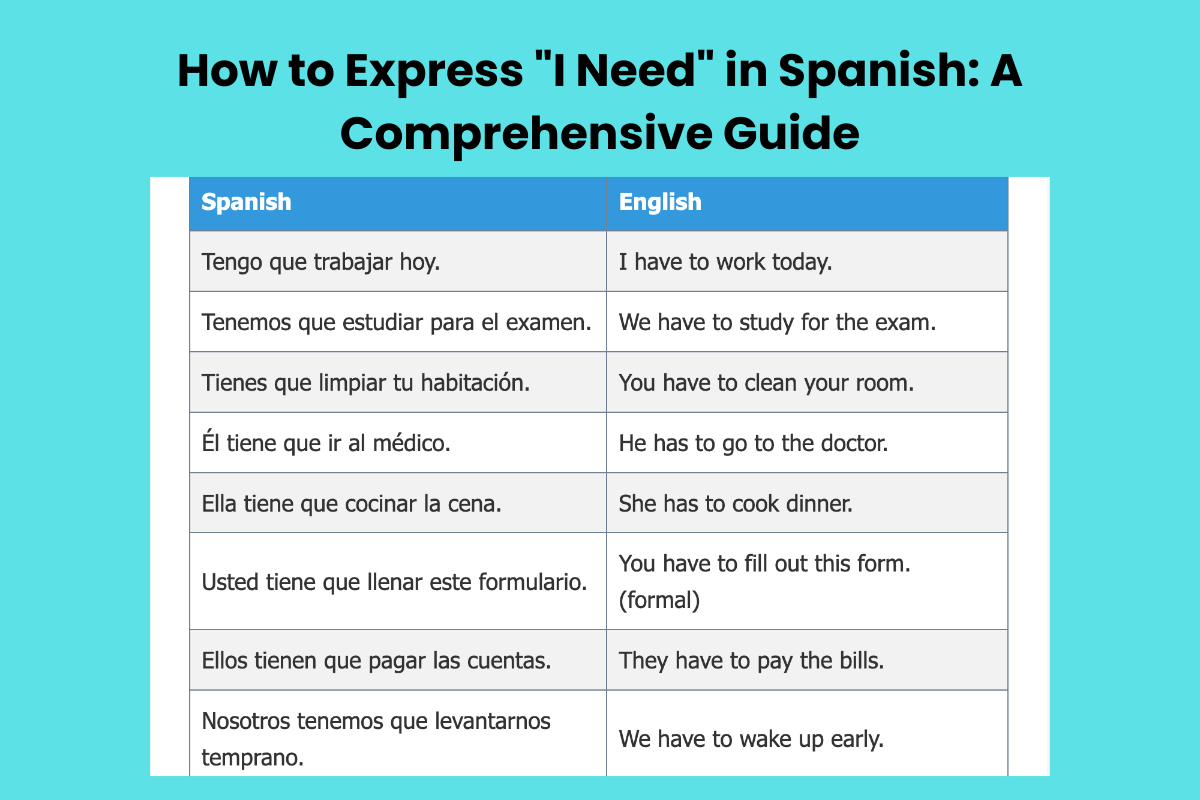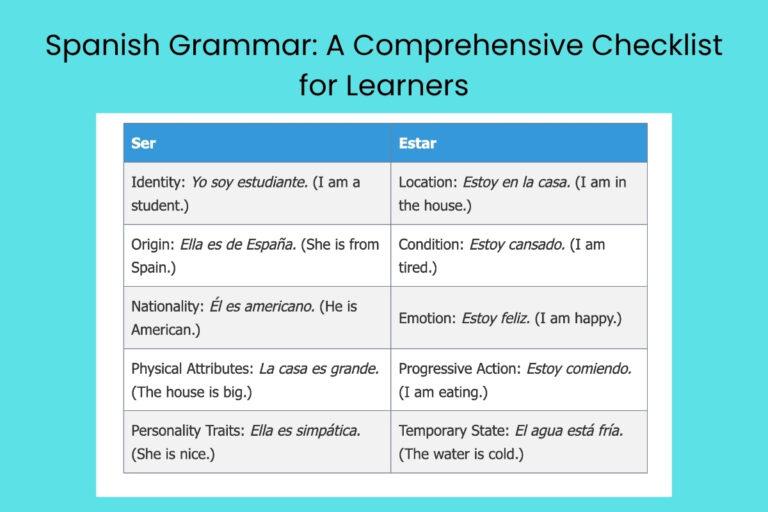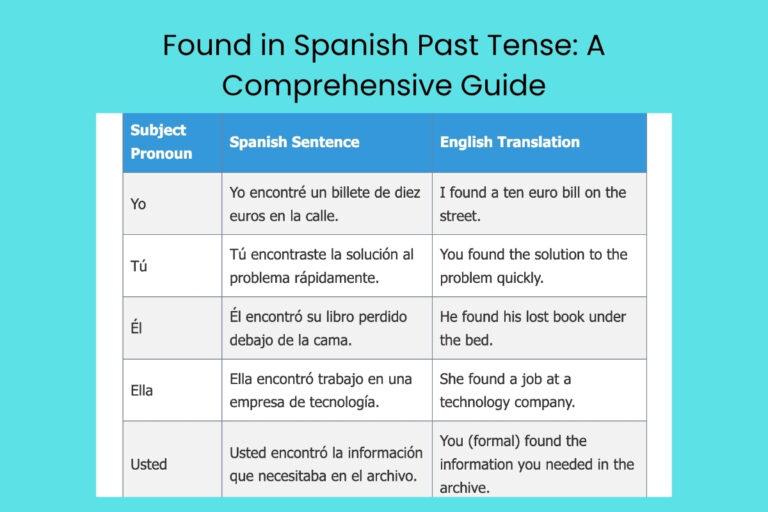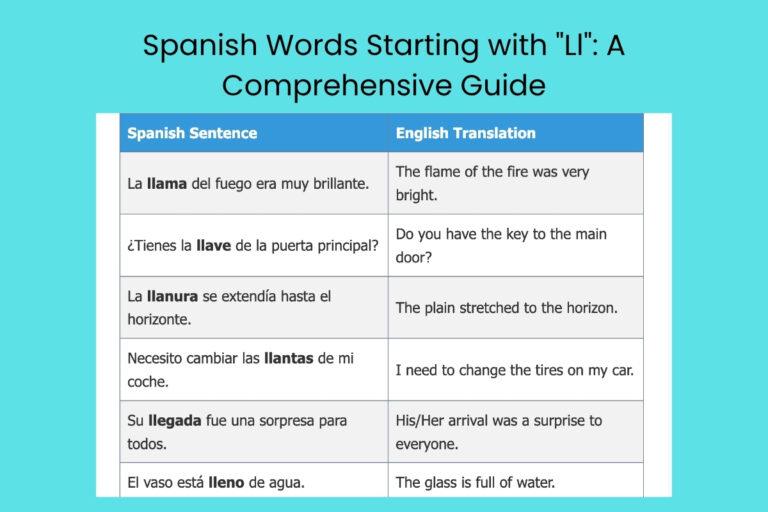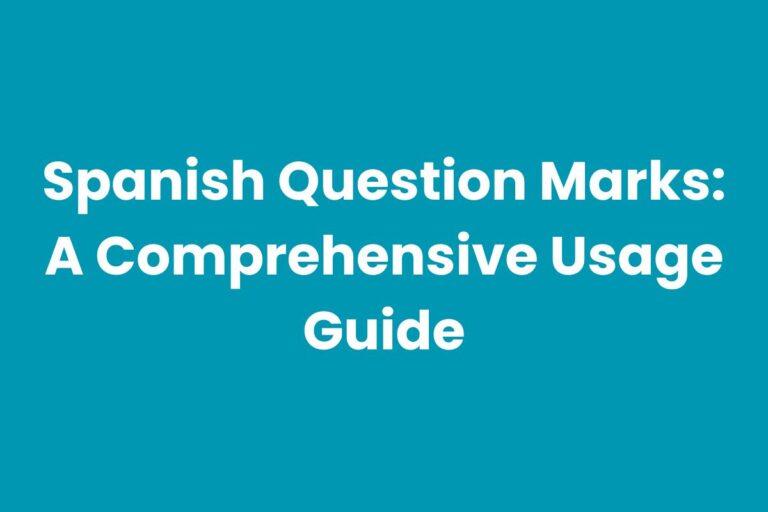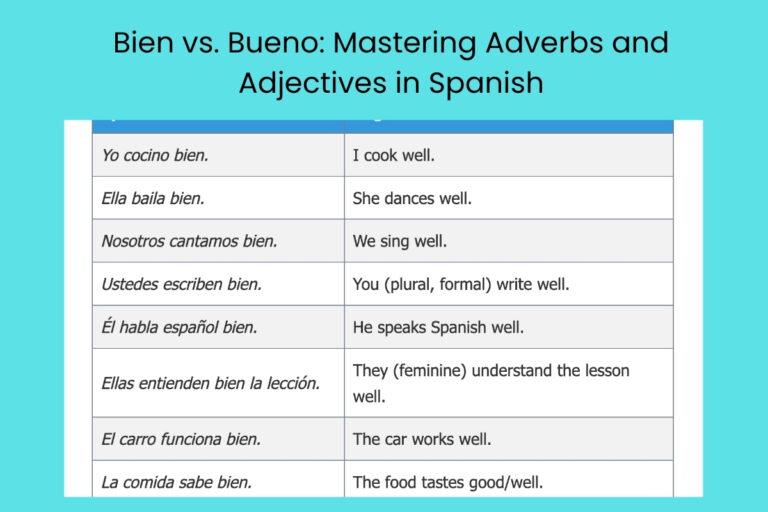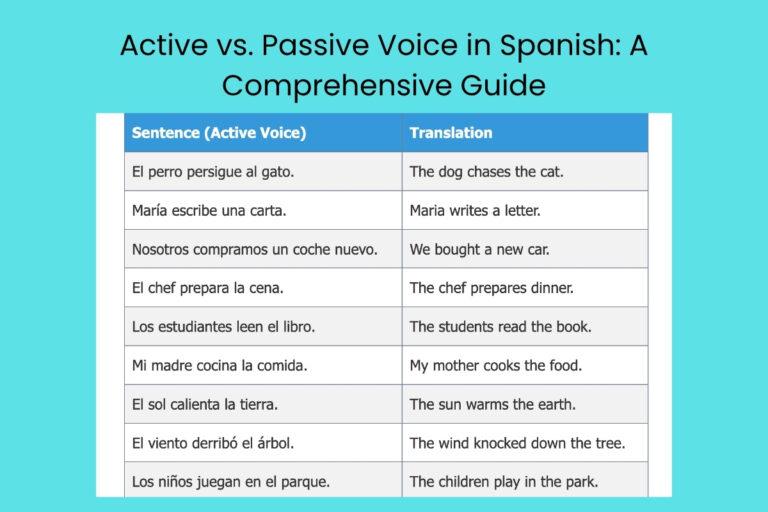How to Express “I Need” in Spanish: A Comprehensive Guide
Understanding how to express “I need” in Spanish is crucial for effective communication in various contexts, from everyday conversations to more formal settings. This phrase is fundamental for expressing necessities, desires, or obligations.
This comprehensive guide breaks down the various ways to convey “I need” in Spanish, providing detailed explanations, examples, and practice exercises. Whether you are a beginner or an advanced learner, this article will equip you with the knowledge and skills to express your needs accurately and confidently in Spanish.
Mastering these expressions will significantly enhance your ability to navigate real-life situations and communicate effectively with native speakers. This guide delves into the nuances of each expression, ensuring a thorough understanding of their appropriate usage.
Definition of “I Need” in Spanish
The concept of “I need” in Spanish can be expressed in several ways, each carrying slightly different nuances and levels of formality. The most common translations include Tener que + Infinitive, Necesitar + Infinitive/Noun, and Hacer Falta + Noun. Each of these constructions serves to convey a sense of necessity or requirement, but they differ in their grammatical structure and the specific context in which they are typically used. Understanding these differences is crucial for choosing the most appropriate expression for a given situation. Moreover, the phrase Me Urge + Infinitive/Noun can be used to express a sense of urgency.
The choice of which phrase to use depends on factors such as the level of formality, the specific type of need being expressed (e.g., obligation, desire, lack), and the desired emphasis. For example, “Tener que” often implies an obligation or duty, while “Necesitar” can refer to both needs and desires. “Hacer falta” typically highlights a lack or absence of something. Therefore, selecting the correct phrase is vital for clear and accurate communication. Each of these expressions is explained in detail below, with examples to illustrate their proper usage.
Structural Breakdown
Understanding the structure of each phrase is essential for using them correctly. Each expression has its own grammatical pattern that must be followed to ensure clarity and accuracy.
This section breaks down the structural elements of each phrase, providing a clear understanding of how they are constructed. Mastering these structures will allow you to form grammatically correct sentences and express your needs effectively.
This structural knowledge will also aid in understanding and interpreting similar phrases in Spanish.
Tener que + Infinitive
Tener que + Infinitive is used to express obligation or necessity. The structure is as follows: (Subject Pronoun) + Tener (conjugated) + que + Infinitive. The verb “Tener” must be conjugated to match the subject pronoun. The infinitive is the base form of the verb, such as “hablar” (to speak), “comer” (to eat), or “ir” (to go). This construction is very common in everyday speech and writing to indicate something that must be done. The emphasis is on the obligation rather than the desire.
For example, “I have to study” is expressed as “Tengo que estudiar.” Here, “Tengo” is the conjugated form of “Tener” for “I” (yo), “que” is the linking word, and “estudiar” is the infinitive form of “to study.” This structure is straightforward and widely used to convey obligations, duties, and requirements. Understanding the conjugation of “Tener” is key to using this phrase correctly with different subjects. For instance, “He has to work” would be “Él tiene que trabajar.”
Necesitar + Infinitive/Noun
Necesitar + Infinitive/Noun is used to express a need or requirement. The structure can be either (Subject Pronoun) + Necesitar (conjugated) + Infinitive or (Subject Pronoun) + Necesitar (conjugated) + Noun. The verb “Necesitar” must be conjugated to match the subject pronoun. When followed by an infinitive, it expresses the need to perform an action. When followed by a noun, it expresses the need for a specific object or thing. This flexibility makes it a versatile option for expressing a wide range of needs.
For example, “I need to sleep” is expressed as “Necesito dormir.” Here, “Necesito” is the conjugated form of “Necesitar” for “I” (yo), and “dormir” is the infinitive form of “to sleep.” If you need an object, such as “I need water,” it would be “Necesito agua.” This construction is useful for expressing both actions and objects that are required. The choice between using an infinitive or a noun depends on what you need. For example, “She needs to buy groceries” would be “Ella necesita comprar comestibles,” while “She needs groceries” would be “Ella necesita comestibles.”
Hacer Falta + Noun
Hacer Falta + Noun is used to express that something is lacking or needed. The structure is (Indirect Object Pronoun) + Hacer Falta + Noun. The verb “Hacer” is typically used in the third-person singular form (“hace”) because the noun is the subject. The indirect object pronoun indicates who needs the noun. This construction highlights the absence or lack of something. It’s a common way to express that something is missing or required in a particular situation.
For example, “I need water” can be expressed as “Me hace falta agua.” Here, “Me” is the indirect object pronoun for “I,” “hace falta” is the fixed expression, and “agua” is the noun. This construction emphasizes that water is lacking. To say “He needs money,” it would be “Le hace falta dinero.” The indirect object pronoun changes to “Le” to match “he.” This structure is particularly useful for expressing that something is missing or required in a general sense. For instance, “We need help” would be “Nos hace falta ayuda.”
Me Urge + Infinitive/Noun
Me Urge + Infinitive/Noun is used to express that something is urgently needed. The structure can be either Me Urge + Infinitive or Me Urge + Noun. The verb “Urge” is often used in the third-person singular form because the infinitive or noun is the subject. This construction conveys a strong sense of urgency. It’s used when something is needed immediately or without delay. This expression is more emphatic than simply saying “I need.”
For example, “I urgently need to leave” is expressed as “Me urge salir.” Here, “Me” is the indirect object pronoun for “I,” and “salir” is the infinitive form of “to leave.” If you urgently need an object, such as “I urgently need help,” it would be “Me urge ayuda.” This construction is useful for expressing immediate requirements. The sense of urgency is stronger than with other expressions. For example, “I urgently need money” would be “Me urge dinero,” conveying a greater sense of immediacy than “Necesito dinero.”
Examples
This section provides extensive examples of how to use each of the expressions to convey “I need” in Spanish. Each expression is illustrated with multiple examples in different contexts to provide a comprehensive understanding of their usage.
These examples cover a range of situations, from everyday needs to more urgent requirements. By studying these examples, you can gain a clearer understanding of how to use each expression correctly and effectively.
Tener que Examples
The following table provides examples of using “Tener que” to express obligation or necessity. Each example includes the Spanish sentence and its English translation, illustrating how this construction is used in various contexts.
These examples cover a range of situations, from daily routines to more specific obligations. Studying these examples will help you understand how to form sentences with “Tener que” and how to use them in real-life conversations.
| Spanish | English |
|---|---|
| Tengo que trabajar hoy. | I have to work today. |
| Tenemos que estudiar para el examen. | We have to study for the exam. |
| Tienes que limpiar tu habitación. | You have to clean your room. |
| Él tiene que ir al médico. | He has to go to the doctor. |
| Ella tiene que cocinar la cena. | She has to cook dinner. |
| Usted tiene que llenar este formulario. | You have to fill out this form. (formal) |
| Ellos tienen que pagar las cuentas. | They have to pay the bills. |
| Nosotros tenemos que levantarnos temprano. | We have to wake up early. |
| Vosotros tenéis que terminar el proyecto. | You have to finish the project. (Spain) |
| Yo tengo que hacer ejercicio. | I have to exercise. |
| Tengo que comprar comida. | I have to buy food. |
| Tenemos que hablar con él. | We have to talk to him. |
| Tienes que ser más paciente. | You have to be more patient. |
| Él tiene que aprender español. | He has to learn Spanish. |
| Ella tiene que tomar una decisión. | She has to make a decision. |
| Usted tiene que seguir las instrucciones. | You have to follow the instructions. (formal) |
| Ellos tienen que llegar a tiempo. | They have to arrive on time. |
| Nosotros tenemos que ayudarla. | We have to help her. |
| Vosotros tenéis que pensar en el futuro. | You have to think about the future. (Spain) |
| Tengo que irme ahora. | I have to leave now. |
| Tenemos que encontrar una solución. | We have to find a solution. |
| Tienes que tener cuidado. | You have to be careful. |
| Él tiene que pedir perdón. | He has to apologize. |
| Ella tiene que prepararse. | She has to prepare herself. |
| Usted tiene que presentarse. | You have to introduce yourself. (formal) |
| Ellos tienen que recordar eso. | They have to remember that. |
| Nosotros tenemos que organizarnos. | We have to organize ourselves. |
| Vosotros tenéis que intentarlo. | You have to try it. (Spain) |
Necesitar Examples
The following table provides examples of using “Necesitar” to express a need or requirement, both with infinitives and nouns. These examples demonstrate the versatility of “Necesitar” in expressing a wide range of needs and desires.
Each example includes the Spanish sentence and its English translation, providing a clear understanding of how to use this verb in different contexts. Studying these examples will help you become more comfortable and confident in expressing your needs in Spanish using “Necesitar.”
| Spanish | English |
|---|---|
| Necesito agua. | I need water. |
| Necesito dormir. | I need to sleep. |
| Necesitamos ayuda. | We need help. |
| Necesitas un coche nuevo. | You need a new car. |
| Él necesita dinero. | He needs money. |
| Ella necesita hablar con él. | She needs to talk to him. |
| Usted necesita más tiempo. | You need more time. (formal) |
| Ellos necesitan vacaciones. | They need a vacation. |
| Nosotros necesitamos comer. | We need to eat. |
| Vosotros necesitáis practicar español. | You need to practice Spanish. (Spain) |
| Necesito un libro. | I need a book. |
| Necesito comprar pan. | I need to buy bread. |
| Necesitamos un mapa. | We need a map. |
| Necesitas ser más amable. | You need to be kinder. |
| Él necesita un trabajo. | He needs a job. |
| Ella necesita ir al supermercado. | She needs to go to the supermarket. |
| Usted necesita una explicación. | You need an explanation. (formal) |
| Ellos necesitan un descanso. | They need a break. |
| Nosotros necesitamos entender esto. | We need to understand this. |
| Vosotros necesitáis más información. | You need more information. (Spain) |
| Necesito un favor. | I need a favor. |
| Necesito aprender a cocinar. | I need to learn how to cook. |
| Necesitamos un plan. | We need a plan. |
| Necesitas ser más responsable. | You need to be more responsible. |
| Él necesita una oportunidad. | He needs an opportunity. |
| Ella necesita ver a su familia. | She needs to see her family. |
| Usted necesita una confirmación. | You need a confirmation. (formal) |
| Ellos necesitan un milagro. | They need a miracle. |
| Nosotros necesitamos creer en nosotros mismos. | We need to believe in ourselves. |
Hacer Falta Examples
The following table provides examples of using “Hacer Falta” to express that something is lacking or needed. Each example includes the Spanish sentence and its English translation, illustrating how this construction emphasizes the absence of something.
These examples cover a range of situations, from everyday needs to more critical requirements. Studying these examples will help you understand how to form sentences with “Hacer Falta” and how to use them effectively to express that something is missing.
| Spanish | English |
|---|---|
| Me hace falta agua. | I need water. |
| Nos hace falta ayuda. | We need help. |
| Te hace falta un coche nuevo. | You need a new car. |
| Le hace falta dinero. | He needs money. |
| Les hace falta vacaciones. | They need a vacation. |
| Me hace falta dormir. | I need to sleep. |
| Nos hace falta comer. | We need to eat. |
| Te hace falta practicar español. | You need to practice Spanish. |
| Le hace falta un libro. | He needs a book. |
| Les hace falta comprar pan. | They need to buy bread. |
| Me hace falta un mapa. | I need a map. |
| Nos hace falta ser más amables. | We need to be kinder. |
| Te hace falta un trabajo. | You need a job. |
| Le hace falta ir al supermercado. | He needs to go to the supermarket. |
| Les hace falta una explicación. | They need an explanation. |
| Me hace falta un descanso. | I need a break. |
| Nos hace falta entender esto. | We need to understand this. |
| Te hace falta más información. | You need more information. |
| Le hace falta un favor. | He needs a favor. |
| Les hace falta aprender a cocinar. | They need to learn how to cook. |
| Me hace falta un plan. | I need a plan. |
| Nos hace falta ser más responsables. | We need to be more responsible. |
| Te hace falta una oportunidad. | You need an opportunity. |
| Le hace falta ver a su familia. | He needs to see his family. |
| Les hace falta una confirmación. | They need a confirmation. |
| Me hace falta un milagro. | I need a miracle. |
| Nos hace falta creer en nosotros mismos. | We need to believe in ourselves. |
Me Urge Examples
The following table provides examples of using “Me Urge” to express an urgent need or requirement. Each example includes the Spanish sentence and its English translation, illustrating how this construction conveys a strong sense of immediacy.
These examples cover a range of situations where something is needed urgently. Studying these examples will help you understand how to form sentences with “Me Urge” and how to use them effectively to communicate a sense of urgency in Spanish.
| Spanish | English |
|---|---|
| Me urge salir. | I urgently need to leave. |
| Me urge ayuda. | I urgently need help. |
| Me urge dinero. | I urgently need money. |
| Me urge un médico. | I urgently need a doctor. |
| Me urge una respuesta. | I urgently need an answer. |
| Me urge ir al baño. | I urgently need to go to the bathroom. |
| Me urge un taxi. | I urgently need a taxi. |
| Me urge hablar contigo. | I urgently need to talk to you. |
| Me urge encontrar trabajo. | I urgently need to find a job. |
| Me urge una solución. | I urgently need a solution. |
| Me urge comer algo. | I urgently need to eat something. |
| Me urge un respiro. | I urgently need a break. |
| Me urge verla. | I urgently need to see her. |
| Me urge dormir. | I urgently need to sleep. |
| Me urge agua. | I urgently need water. |
| Me urge una llamada. | I urgently need a call. |
| Me urge saber la verdad. | I urgently need to know the truth. |
| Me urge irme de aquí. | I urgently need to leave here. |
| Me urge un abogado. | I urgently need a lawyer. |
| Me urge un consejo. | I urgently need advice. |
| Me urge un cambio. | I urgently need a change. |
| Me urge comprar un boleto. | I urgently need to buy a ticket. |
| Me urge vender mi coche. | I urgently need to sell my car. |
| Me urge una decisión. | I urgently need a decision. |
| Me urge una explicación. | I urgently need an explanation. |
Usage Rules
Understanding the specific usage rules for each expression is crucial for using them correctly and avoiding common errors. This section provides detailed rules for each expression, including exceptions and special cases.
By following these rules, you can ensure that you are using each expression appropriately and effectively. Mastering these usage rules will significantly enhance your ability to communicate accurately and confidently in Spanish.
Tener que Rules
Tener que is used to express obligation or necessity. The verb “Tener” must be conjugated to match the subject. It is always followed by “que” and an infinitive. The meaning is similar to “have to” or “must” in English. It’s important to remember to conjugate “Tener” correctly to match the subject pronoun. For example, for “I,” it’s “Tengo,” for “you,” it’s “Tienes,” and so on. This expression is widely used in everyday conversation to indicate duties, requirements, and obligations.
Exception: In some Latin American countries, you might hear “Tener de + Infinitive” used instead of “Tener que + Infinitive,” although this is less common. For example, “Tengo de estudiar” instead of “Tengo que estudiar.” However, it’s generally safer and more widely understood to use “Tener que + Infinitive.” Also, be aware of the difference between “Tener que” and “Hay que,” where “Hay que” expresses a general obligation without specifying who needs to do it (e.g., “Hay que estudiar” – One must study).
Necesitar Rules
Necesitar can be followed by either an infinitive or a noun. When followed by an infinitive, it expresses the need to perform an action. When followed by a noun, it expresses the need for a specific object or thing. The verb “Necesitar” must be conjugated to match the subject. This verb is versatile and can be used in a wide range of contexts to express various needs and desires. It’s a fundamental verb for expressing requirements in Spanish.
Exception: When expressing a need for something abstract, such as “I need peace,” you can use “Necesitar” with the noun. However, for more nuanced expressions, consider using other verbs or constructions. For example, instead of saying “Necesito paz,” you could say “Quiero paz” (I want peace) or “Anhelo paz” (I long for peace). Also, be mindful of the difference between “Necesitar” and “Querer” (to want). “Necesitar” implies a need, while “Querer” implies a desire.
Hacer Falta Rules
Hacer Falta is used to express that something is lacking or needed. The verb “Hacer” is typically used in the third-person singular form (“hace”) because the noun is the subject. The indirect object pronoun indicates who needs the noun. The structure is (Indirect Object Pronoun) + Hacer Falta + Noun. This construction emphasizes the absence or lack of something. It’s a common way to express that something is missing or required in a particular situation.
Exception: The verb “Hacer” does not change to agree with the noun. It always remains in the third-person singular form (“hace”). The indirect object pronoun is essential to indicate who needs the missing item. For example, “Me hace falta dinero” (I need money), “Te hace falta un coche” (You need a car), “Le hace falta ayuda” (He/She needs help). Also, be aware that “Hacer Falta” is generally used for things that are lacking or missing, not for actions that need to be performed.
Me Urge Rules
Me Urge is used to express an urgent need or requirement. The verb “Urge” is often used in the third-person singular form because the infinitive or noun is the subject. This construction conveys a strong sense of immediacy and urgency. It’s used when something is needed immediately or without delay. This expression is more emphatic than simply saying “I need.”
Exception: The verb “Urge” typically remains in the third-person singular form, even when followed by an infinitive. The indirect object pronoun (“Me” in this case) indicates who has the urgent need. For example, “Me urge salir” (I urgently need to leave), “Me urge ayuda” (I urgently need help), “Me urge dinero” (I urgently need money). Be careful not to confuse “Me Urge” with other expressions of need. “Me Urge” specifically conveys a sense of urgency that is not present in other expressions.
Common Mistakes
Many learners make common mistakes when trying to express “I need” in Spanish. This section highlights these errors and provides correct examples to help you avoid them.
Understanding and correcting these common mistakes will improve the accuracy and clarity of your Spanish communication. By being aware of these pitfalls, you can avoid misunderstandings and communicate more effectively with native speakers.
| Incorrect | Correct | Explanation |
|---|---|---|
| Yo necesito estudiar. | Necesito estudiar. | The subject pronoun “Yo” is often omitted because the verb conjugation already indicates the subject. |
| Tengo que agua. | Tengo que beber agua. | “Tener que” should be followed by an infinitive verb, not a noun. |
| Me hace falta estudiar. | Necesito estudiar. | “Hacer falta” is used with nouns, not infinitives. |
| Necesito que voy. | Necesito ir. | “Necesitar” is followed by an infinitive directly, not a clause introduced by “que.” |
| Urgo ayuda. | Me urge ayuda. | The indirect object pronoun “Me” is necessary with “Urge.” |
| Tengo necesidad agua. | Necesito agua. | While grammatically correct, it sounds awkward. “Necesito agua” is more natural. |
| Hago falta agua. | Me hace falta agua. | The correct form is “Hacer falta” with the indirect object pronoun. |
| Yo urge salir. | Me urge salir. | The indirect object pronoun “Me” is necessary with “Urge,” and the verb is used in third person. |
Practice Exercises
These practice exercises will help you solidify your understanding of how to express “I need” in Spanish. Each exercise focuses on a different aspect of the topic, from translation to sentence construction.
By completing these exercises, you can test your knowledge and identify areas where you may need further practice. The answers are provided to help you check your work and learn from your mistakes.
Exercise 1: Translation
Translate the following sentences from English to Spanish using the appropriate expression for “I need.”
| English | Spanish (Answer) |
|---|---|
| I need to study. | Necesito estudiar. / Tengo que estudiar. |
| I need water. | Necesito agua. / Me hace falta agua. |
| I need to leave urgently. | Me urge salir. |
| I have to work. | Tengo que trabajar. |
| I need help. | Necesito ayuda. / Me hace falta ayuda. |
| I need money urgently. | Me urge dinero. |
| I have to eat. | Tengo que comer. |
| I need a new car. | Necesito un coche nuevo. / Me hace falta un coche nuevo. |
| I need to sleep. | Necesito dormir. / Me hace falta dormir. |
| I have to go to the doctor. | Tengo que ir al médico. |
Exercise 2: Fill in the Blanks
Fill in the blanks with the correct form of the verb and any necessary pronouns or prepositions.
| Sentence | Answer |
|---|---|
| Yo ______ que estudiar. | Yo tengo que estudiar. |
| Me ______ falta agua. | Me hace falta agua. |
| ______ urge salir. | Me urge salir. |
| Nosotros ______ ayuda. | Nosotros necesitamos ayuda. / Nos hace falta ayuda. |
| Él ______ dinero. | Él necesita dinero. / Le hace falta dinero. |

